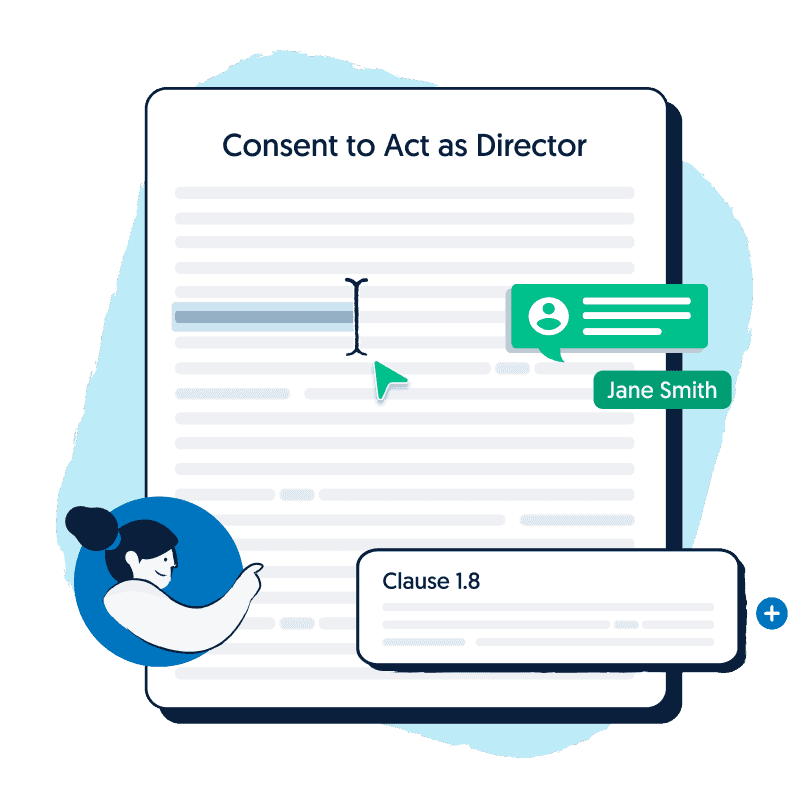Based in Sydney, Raja is a law student enrolled in a Bachelor of Laws and Bachelor of Communications (Writing and Publishing) at the University of Technology Sydney. He is passionate about transferring knowledge in relation to businesses, legal advice and marketing direction. Raja has experience working in immigration law and is driven by the writing, editing and publishing process of content.
Written by
Raja Abbas
Reviewed by
💡 Key insights
- An executive director is a board member who also works as part of the company’s management team and handles day to day operations, staff, finance, or marketing functions.
- A non‑executive director does not manage daily operations and sits on the board to offer oversight, strategic guidance, and independent judgment.
- Both executive and non‑executive directors share the same legal duties under Australian corporate law, such as acting in good faith and avoiding conflicts of interest.
- Having both types of directors helps balance a company with executives running day to day operations and non‑executives providing oversight and guiding long‑term strategy.
Executive director vs non-executive directors, what are the differences between the two? In Australia, there are different types of directors which are assigned specific duties within the business. All directors in Australia have broad duties that are generic to any company such as the duty to prevent insolvency and duty to act in good faith for the business. One way of classifying directors is between those who serve as executive directors and those who do not hold executive positions.
This article will answer the question: executive director vs non executive director, what’s the difference?
Table of Contents
Who is an Executive Director in a Company?
An executive director is an individual who holds the responsibility of leading a company and working with the board of directors to ensure the company’s targets are being met. Executive directors manage the day-to-day operations of a business but also the senior management of the company. Executive directors are also employees of the company, and this will be specified in their director agreement.
Typical Roles of an Executive Director
- Day to day management of the company.
- Implementing the strategies the company should utilise.
- Managing staff members and clients of the company.
- Assisting with the key business functions of the company such as finance, marketing and human resources.
- Acting as the face and spokesperson for the company.
Types of Executive Directors
Different types of executive directors exist within a company. Key executive directors include Chief Executive Directors (CEO), Managing Directors (MD) and Secretaries.
Chief Executive Officer (CEO)
The Chief Executive Officer (CEO) of a company is the highest ranking executive role. CEOs have the responsibility to make large decisions in regards to the company’s direction and are usually a business’s public spokesperson.
Responsibilities for a CEO include:
- Key business decisions: scaling, approval of new products, the direction the business is heading.
- Interacting with business partners and board of directors.
- Monitoring company performance.
Managing Director (MD)
The roles and responsibilities of CEOs and Managing Directors (MD) can sometimes overlap as they are both high ranking roles. CEOs have a more holistic role in guiding the business whilst managing directors have a focus on more individual departments within the business.
Responsibilities of the MD include:
- Determining roadblocks within different departments and strategizing to overcome them.
- Creating short-term and long-term goals within the business.
- Monitoring daily performance and ensuring the business continues to generate profit.
Secretary
In response to the necessity of businesses being transparent with regulatory bodies and legal policies, the role of secretaries has become central to the operations of a business. Secretaries are in charge of a business’s compliance in all forms.
Some responsibilities a secretary has include:
- Oversees financial and legal compliance.
- Supporting the board of directors through providing financial and legal information in regards to the company’s operations.
- Maintaining business records.

Get your Consent to Act as Director legal document for free.
A Consent to Act as Director document is a written consent that the director agrees to be a director of a company. Access other 350+ documents when you sign up to a plan with Lawpath.
What Challenges do Executive Directors Face?
Executive directors are responsible for a lot of the business’s operations and in response, face challenges such as:
- Staff recruitment and maintenance.
- Developing financial strategies to prevent a low level of cash flow in the business.
- Having to constantly update the board of directors on business decisions.
- Developing strategies which provide a competitive advantage over competitors.
Who is a Non-Executive Director in a Company?
Non-executive directors act as an external individual for the company. Their scope is not as specific as executive directors as they are not involved in day-to-day operations within the business, but are instead involved in policy making and strategic plans. Non-executive directors are members within the board of directors, and have signed a director agreement with the company to serve in that role, however are not employees of the company. Non-executive directors act in the best interests of corporate stakeholders and observe executive directors.
Why is it Important to have Non-Executive Directors?
Non-executive directors hold an individual view on the business and provide an outside perspective on how to better the business as they operate externally. Their role is constructive and they are constantly assessing how to assist the company in achieving its goals through policy making.
The roles of a non-executive director include:
- Guiding the company as it expands.
- Providing alternative views to the business.
- Attending meetings expressing these thoughts.
They hold a more consultative role than executive directors as non executive directors are not involved in the day to day operations of the company.
What is the Process of Appointing a Director?
The Corporations Act 2001 (Clth) provides a rigid structure of how directors are appointed. In order to appoint a director, a general meeting will take place where a majority vote of 50% is required. The removal of a director is done the same way, requiring a majority vote of 50% of shareholders in a general meeting. A letter of appointment is issued to the appointed director to confirm their role and define the scope of responsibilities they are expected to fulfil.
ASIC Compliance
ASIC must be informed within 28 days of the director being appointed. This is done through filling out a Changes to company details form (previously a 484 form) which is issued by ASIC.

Get on demand legal advice for one low monthly fee.
Sign up to our Legal Advice Plan and access professional legal advice whenever you need it.
Why is a Director ID Important?
Director ID or Director Identity Number (DIN) is a 15-digit unique identification number that all directors must hold. Failing to attain a Director ID can result in criminal and civil penalties. The importance of applying for a Director ID is rooted in it monitoring illegal activity, preventing fraudulent identities, documenting the directorial role and more.
Director IDs are used to:
- Monitor illegal activity.
- Confirm identity
- Document the directorial role.
- Prevent fraudulent identities.
It is important to stay compliant with the legal regulations surrounding DIN. Lawpath offers a service which assists business owners in staying compliant with Director ID Numbers alongside other aspects of operating a business.
FAQS
Do executive directors have more power than non-executive directors?
Executive directors are usually more powerful than non executive directors. The basis for this is that executive directors have the capacity to terminate employees, manage day to day operations and alter the company’s direction. Non executive directors still attain a large amount of power, however it is ultimately executive directors that retain more power.
How do you know if a director is executive or non-executive?
In order to differentiate between executive directors and non executive directors, you must look at the tasks they perform in relation to the business. Executive directors are employees of the company and complete tasks that relate to the day to day management of the company, whilst non-executive directors perform tasks associated with the business’s direction and monitoring business performances.
Conclusion
To conclude, there are fundamental differences between executive directors and non-executive directors. Whilst both directors have an obligation to act in the interests of the company and hold a powerful role, their responsibilities do vary as directors have a role more specific to the day-to-day running of the company, and non-executive directors holding a broader and more external role to the company. Both types of directors are central to running a business to its full potential.

Get a fixed-fee quote from Australia's largest lawyer marketplace.







